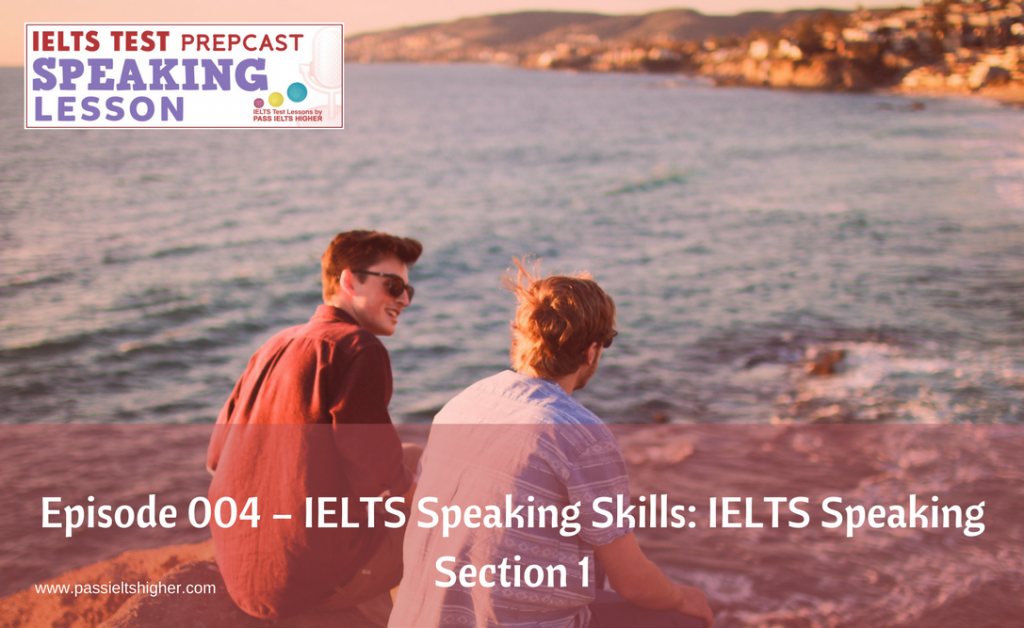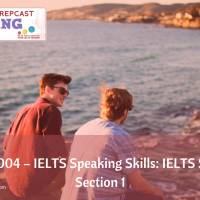

- Social:
- Link:
The subject of this lesson is IELTS Speaking skills, and we thought we’d start off with just an overview.
Today’s lesson is all about IELTS speaking skills and, in particular, section 1 of the IELTS speaking test. Andrea takes us through a description of the whole of the IELTS speaking exam, and from then, we focus on the section 1 of the test.
Click here to be taken to iTunes where you can subscribe to all of the IELTS Test Prepcasts.
If you enjoy this free IELTS Test Prepcast, please show us your support and appreciation by clicking here. This will shoot you over to iTunes, where you can leave a rating and review.
Podcast Transcript
IELTS Test Prepcast Episode 4
IELTS Speaking Skills: IELTS Speaking Section 1
The IELTS Test Prepcast provides three free IELTS test lessons each week for candidates who are aiming for IELTS band scores 7, 8, or 9.
I’m Steve Price. I’m the founder of the Pass IELTS Higher website, which was started in late 2010 and has been successfully helping students achieve higher band scores since.
Andrea Price currently lives and works in London, teaching IELTS, and has previously lived in Spain. She is a qualified teacher of English as a second language and has been teaching the subject at home and abroad for over twenty years.
If you enjoy this free IELTS Test Prepcast, please show us your support and appreciation by heading over to www.ieltstestprepcast.com and clicking the “subscribe on iTunes” button at the top of the page. This will shoot you over to iTunes, where you can leave a rating and review.
And now for today’s IELTS lesson . . .
Steve: Hello. Today’s lesson is all about IELTS speaking skills and, in particular, section 1 of the IELTS speaking test. I have with me Andrea, and she’s going to take us through a description of the whole of the IELTS speaking exam, and from then, we’ll focus on the section 1 of the test.
Andrea: Hi. Speaking exam is divided into three sections and lasts from eleven to fourteen minutes. You’re being tested on your fluency and your ability to express yourself in English, how you use complex grammar, and your pronunciation. But fluency is especially important. Before I look at each section, and today is section 1, I’ll just give you some general advice. Remember you’re being assessed from the minute you walk into the exam room, so always try to use your most complex expressions in English and complex grammar to impress the examiner. Fluency is very important, so try not to hesitate when speaking or try not to think too much about the accuracy of your answers. This will make you sound less fluent and lose you valuable marks.
Steve: For the fluency point, is it advisable to ask students to learn maybe an opening by rote so that they can come in fully prepared, being able to talk about where they come from or what university they go to or whatever.
Andrea: I would say no, really. If the examiner realizes that you’ve prepared something you’re speaking about, you actually get zero, so it doesn’t really help you.
Steve: Okay.
Andrea: What I would say is you come in with special expressions—and we’re going to talk about that in a little bit—and just so that you use those expressions when you’re talking but you can talk naturally without preparing what you’re going to say.
Steve: Okay.
Andrea: Also, if the examiner cannot understand something you say because of your pronunciation, you will lose valuable marks. If you know this happens when people can’t understand you outside of the classroom, then remember to speak very clearly as this will help.
Steve: You mentioned that they can lose marks if their pronunciation is unclear. What’s the sort of level of marks in the overall speaking test for pronunciation?
Andrea: Well, in the speaking you’re examined in four areas, and one of the areas is pronunciation. So obviously, if you’re not very good at pronunciation, you’ll lose a quarter of your marks—you will lose marks from a quarter of your marks, and that drops your band quite a lot.
Steve: Okay. I think this is another example of where it’s very important that the IELTS candidates become extremely familiar with the IELTS public band descriptor tables.
Andrea: Yes, I agree with you. What I always advise my students, is to have those public band descriptors by them when they’re preparing anything. So for example, if you’re practicing your speaking, you can think about what you’re going to say. You can look at the band descriptors, and each section of the band descriptor tells you how you can improve your marks.
Steve: Okay. I think we’ve said before—and well say it again here, just in case people happened to, heard our earlier lessons—we will be doing separate lessons entirely based around the IELTS public band descriptors so that people can familiarize themselves and learn how to use them properly.
Andrea: Yes, and that’s a good idea because obviously, they can also teach themselves to improve their own marks without the help, or on top of the help of their own teacher. So in section 1, you’re asked to, you’ll be asked to introduce yourself. After that you’re allowed two minutes to talk about a topic which is personal to you. Often this is a variation on where you live or about working or studying. After this, there are three minutes left to discuss one or two more general topics, but you try to reply to these topics using more complex expressions in order to get a higher band score.
Steve: So I think what we’ll do for that one is we’ll give a separate lesson dedicated entirely to how to prepare for the different sections of the speaking test.
Andrea: Yes, okay. Some more advice, just to stop you just saying yes or no, which is very easy but won’t get you very high marks, how to improve your replies. What I always suggest to my students is for them to watch lots of television. I do believe this is useful anyway because it improves your listening skills. If you’re listening to very fluent English all the time, that means you’re listening comprehension skills will improve. And hopefully, also, while those skills improve, you’ll be able to put it into active practice by speaking or writing using that English. One way, for speaking, to improve your speaking, is to watch TV talk shows and note down the ways in which the interviewer and interviewee ask and respond to questions. Obviously, their responses to questions are things that you could imitate. So if you make notes of those, that will be quite useful for you. It is a speaking exam, but you could also be expected to be a little bit more serious, so I would also advice watching more serious programs with debates, such as Question Time on BBC 1, and again note down the useful and unusual replies.
Steve: Okay. So your point here really is, if candidates were to watch interactive talk shows where people are being interviewed, so they’re having, you’re hearing the questions raised and the responses given, that will help them to understand, for example, when to use past tense, present tense, and future tense, and so on.
Andrea: Yes, I think that will be included too, but they can also pull out unusual ways to reply which they might not think about themselves. They might not realize that English people reply to questions in different ways or speak as native speakers.
Steve: Okay.
Andrea: Having noted down these expressions, and try to remember them, and a more useful way to remember them is to try to use them when you’re speaking to other people. One way to do this is to try to initiate conversations with native speakers or ask them to help you practice. In this way, you can recycle your new expressions, and that will help you remember them more easily. It will help you use them naturally, and so that when you’re in the speaking exam, this will really help. Again, you could read magazines and articles about typical speaking topics in the exam. Note down the useful expressions, and this will help you achieve a higher band score. First, it will give you more vocabulary, and secondly, it will give you ideas and ways to express yourself. This means, in turn, that you will have a store of collocations, and you get high marks for using collocations. And if you’ve been studying them and you’ve practiced them, you’ll be able to put them into your speaking exam more naturally. And if you practice your new expressions, you’ll be able to remember them.
Steve: Okay.
Andrea: The final advice is on your accuracy. Steve has already mentioned listening carefully and responding in the way the person has spoken to you. For example, if you’re asked a question in the present tense—for example, “Do you live in London?” “Yes, I do”—You would reply in the present tense. If you’re asked a question in the past tense—“When did you arrive in England?” “I came last year”—you would reply in the past tense. So the first, your first question, you always reply to in the same grammar. After that, you can change, and that’s under your control then. If you change the tenses, you can show off your own knowledge of more complex grammar. I’ve just said it’s under your control so you can manage the tense you use. Imagine you have been asked “What’s your favourite colour?” A typical response might just be something like “Red.” And that’s not going to get you very many marks. If you control your language, you could reply in a different way, and you could use something called the second conditional, which you can either study—we have show notes for this as well. Or you can, you know it already. If you’re asked “What’s your favourite colour?” why not reply, “If I had to choose my favourite colour, I would say it was red.” And so you’ve changed the grammar, and you’ve actually used complex grammar, and you’ll get much better marks for that.
Steve: Okay, thank you for that, just to very briefly summarize what we’ve learned today… your initial point, which you started out with, was candidates need to remember that they’re being assessed from the minute that they walk into the exam room.
Andrea: Yes.
Steve: So they should, if they can, try to use their most complex expressions and grammar right from the outset.
Andrea: Yes.
Steve: And the reason for this is that the examiner will form a view of their capability based on that first interaction.
Andrea: Yes.
Steve: The reason they do this is because that’s what we do naturally.
Andrea: Yes. I’ll just point out, you could of course be very, very nervous, and then right at the beginning, your English won’t be very good. But as you warm up and as you feel more confident, your English will get better. So don’t worry; you will be reassessed if you can see that you’re getting better.
Steve: Okay. The next point you mentioned is that fluency is very important and that hesitancy, when you’re speaking, can be construed as being a lack of fluency. But also, you cautioned against using—candidates learning by rote.
Andrea: Yes.
Steve: And coming in with pre-prepared soliloquies almost.
Andrea: Yes. I would say definitely don’t do that because that’s really bad.
Steve: Okay. And your suggestion to counter that was learn expressions and drop them naturally into your speaking.
Andrea: Yes.
Steve: Okay. Then you explained a little bit about what the IELTS speaking section 1 test was, how it’s structured, and then you provided a bit of advice on how to improve your replies. In particular a key piece of advice was to, for candidates to make sure they watch TV talk shows which have interaction between an interviewer and interviewee, because then they’re able to see how questions are asked and how people respond to them, and they can also learn how to adopt unusual methods of replying.
Andrea: Yes.
Steve: And finally, you highlighted that it is important to listen to the questions that are asked and to reply to those in the same, using the same grammar as the question that’s being asked. And then after that, what you can do is you can try to control things a little bit more by changing to show off your prowess or knowledge of more complex grammar.
Andrea: Yes, exactly.
Steve: Okay, I think, for today, we’ve covered everything that we wanted to for this overview. I’d like to thank you for teaching us that, and we’ll see you next time.
Andrea: Yes. See you soon. Bye.
End of Lesson
You’ve been listening to the IELTS Test Prepcast, which provides free IELTS lessons for candidates aiming for IELTS band scores 7, 8, or 9. Subscribe to this Prepcast in iTunes, or download it from our website, www.ieltstestprepcast.com.

Leave a Reply